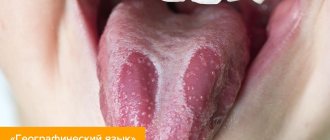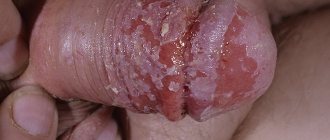Coughing up blood: causes of illness in adults
In some cases, when the cough is strong, dry and hysterical, a small amount of scarlet blood in the sputum may be the result of damage to small superficial vessels in the bronchi, pharynx or trachea. This phenomenon is not dangerous if it is not accompanied by other alarming signs. However, if the cough does not subside, the symptoms increase, the volume of blood is significant, or the streaks do not disappear, this may be a sign of serious problems and illnessesSource: EarwoodJS, ThompsonTD. Hemoptysis: evaluation and management // Am Fam Physician. 2015 Feb 15;91(4):243-9..
Oral injuries
If the mucous membrane is damaged, a little blood may enter the taste buds and, accordingly, a metallic taste appears in the mouth.
The causes of mucosal injury may be:
- tartar in the mouth;
- improper dental care, for example, using a brush that is too hard;
- incorrectly installed dentures;
- incorrectly installed braces.
Often the cause of the taste of blood in the mouth is a more significant injury, such as to the esophagus or throat. For example, a strong cough often leads to mucosal injuries. After an injury, a small amount of blood enters the mouth and causes an unpleasant taste.
What diseases are typical for hemoptysis?
The appearance of sputum with blood when coughing is called hemoptysis, it is possible with various diseases:
- COPD with severe bronchitis or emphysema;
- pneumonia (acute or exacerbation of chronic);
- tuberculous lesions of the lungs and bronchi;
- cancerous tumor in the lungs;
- injuries to the chest and lung tissue.
In addition, impurities of blood in coughed up mucus are possible with lesions of the nasopharynx (including nosebleeds) and the upper parts of the digestive tract.
If cough or hemoptysis appears, even without fever, it is important to consult a doctor. This is especially dangerous if symptoms such as fever, shortness of breath, severe weakness, pain in the body or limbs appear against the background of coughing up blood. You need to call an ambulance immediately. Such an attack may be a symptom of a serious illness. It is important to immediately determine the correct diagnosis and begin treatment. Source: K. Krenev, Ya Kabysh, O Yudin. Difficult patient or patient with hemoptysis // Sciences of Europe, 2022, No. 48, pp. 17-22.
Causes of blood taste in mouth
Changes in taste during pregnancy
Pregnant women are characterized by sharp hormonal changes, which cause an increased sense of smell, changes in taste preferences and sensations. As a result, a specific metallic taste, perceived as the taste of blood, occurs when eating fully cooked meat products, fish or even vegetable dishes. The symptom occurs periodically and often goes away on its own after some time.
Anemia
The main reasons for changes in taste are a drop in hemoglobin and coagulation disorders, leading to capillary fragility. The taste of blood in the mouth is especially common in young women if anemia develops during pregnancy. Its persistence throughout the day, combination with painful nausea, the urge to vomit, indicates concomitant pathology (coagulopathy, hypovitaminosis). In the absence of gestation, an anemic change in taste is observed with chronic bleeding, neoplasia, etc.
Gingivitis
Chronic inflammatory disease of the gums occurs in 20-30% of the adult population. Usually, the taste of blood appears after brushing your teeth with hard toothbrushes, which cause trauma to the mucous membranes and bleeding gums. When gingivitis worsens, an unpleasant taste in the mouth is felt at any time of the day for no apparent reason. The symptom is accompanied by redness and swelling of the gums, and the formation of difficult-to-remove plaque on the teeth.
Other dental causes
A bloody taste in the mouth is detected in various pathological processes: medium and deep caries, pulpitis, periodontitis. The symptom can occur spontaneously, but is more often provoked by eating solid food and brushing teeth. A specific unpleasant taste of blood develops against the background of intense pain in the area of the diseased tooth. Odontogenic causes are dangerous due to their complications, so you need to visit a specialist as soon as possible.
ENT pathology
The taste of blood in the mouth often occurs with chronic rhinitis and sinusitis, in which atrophy of the mucous membrane occurs and scanty bleeding periodically begins. The bloody taste bothers you in the morning, when the blood that has accumulated overnight begins to flow down the back wall of the throat. The person experiences severe nausea and aversion to food. The discomfort disappears after rinsing your mouth and brushing your teeth.
Respiratory infections
Most often, the symptom occurs with influenza, for which a toxic effect on capillaries and spontaneous bleeding from the oral mucosa is pathognomonic. The taste occurs periodically in the first 2-3 days of infection, then disappears on its own. A similar clinical picture also develops in severe ARVI, pharyngitis and laryngitis.
Diseases of the gastroduodenal zone
GERD and gastritis are characterized by a taste of blood in the mouth after drinking alcohol, stress and heavy physical activity. In these diseases, the main reasons for the unusual taste are the formation of erosions in the mucous membrane of the digestive canal, which, under the influence of unfavorable factors, begin to bleed. Patients experience severe burning and pain in the chest, accompanied by an unpleasant sensation of blood in the mouth.
Cirrhosis
Fibrous liver damage provokes dilation of the esophageal veins and thinning of their walls, which is fraught with spontaneous bleeding. In the mouth of patients with cirrhosis, a strong taste of blood suddenly begins to be felt, and with massive bleeding, vomiting of dark red blood begins. The symptom occurs more often in men who abuse alcohol. If there is a suspected rupture of esophageal varicose veins, a person needs emergency medical care.
Cardiovascular disorders
The symptom is determined by hypertension, vasculitis, which is accompanied by thinning and fragility of the capillaries. A specific blood taste appears after physical activity or stress, leading to a rise in blood pressure and rupture of small blood vessels. During an attack of angina, accompanied by pain in the heart and shortness of breath, sometimes there is a feeling of an unpleasant taste of blood in the mouth.
Rare causes
- Diseases of the respiratory system
: bronchial asthma, chronic obstructive pulmonary disease, tuberculosis. - Poisoning with heavy metals
: lead, mercury, cadmium, etc. - Gastrointestinal pathology
: pancreatitis, cholecystitis, hepatitis. - Tumors
: malignant neoplasms of the oral mucosa and tongue, lung cancer.
Diagnostic methods
Since coughing up blood can be a sign of a serious illness, it is important to make a diagnosis as quickly and accurately as possible. A complex of laboratory tests and necessarily radiography or CT, ultrasound or MRI are required to determine the source of bleeding, especially if it is severe enough. Sometimes blood may not come from the respiratory system, but from soft tissues, the pleural cavity or the esophagus.
A detailed medical history is important - all health problems that preceded the appearance of the cough (smoking, injuries, colds, abdominal pain, etc.). They may indicate possible causes. If the source of bleeding is in the bronchi, an additional bronchoscopy may be prescribed. All diagnostic procedures are usually performed during hospitalization in a clinic.
When a person needs emergency help
Minor hemoptysis with a correctly diagnosed cause is not a reason for emergency hospitalization. After the examination, the doctor prescribes the necessary treatment, taking which the patient usually notes a regression of the symptoms of the disease.
A cause for concern is the copious secretion of foam and red blood when coughing. This is a symptom of pulmonary hemorrhage, if suspected, it is necessary to urgently call an ambulance. In addition, its symptoms are:
- cyanosis or pallor of the mucous membranes and skin;
- increasing tachypnea and tachycardia;
- drop in hemodynamics (decreased blood pressure, thready pulse);
- cold sticky sweat, ringing in the ears, dizziness.
Before the ambulance team arrives, the patient should be in a sitting position or lying on his side with his head turned to the side. This is necessary in order to prevent aspiration of blood. Patients with pulmonary hemorrhage are admitted to the intensive care unit and continue to be treated there until their condition is completely stabilized.
Treatment
It is important to remember that hemoptysis is only a symptom. It is important to treat the underlying condition and make efforts to stop the bleeding. If these are inflammatory processes (pneumonia, bronchitis), a course of antibiotics and anti-inflammatory therapy in combination with drugs to regulate blood clotting are indicated. Regular cleansing of the bronchi from bloody sputum (sanitation) is also indicated.
If this is a tuberculosis lesion, anti-tuberculosis therapy is necessary, including surgical interventions on the affected lesions (cavities). For injuries and abscesses, the solution to problems is surgery; for cancerous lesions, tactics are selected individually, depending on the stage. Source: Ittrich H, Bockhorn M, Klose H, Simon M. The Diagnosis and Treatment of Hemoptysis // The Diagnosis and Treatment of Hemoptysis.Dtsch Arztebl Int. 2017 Jun 5;114(21):371-381. doi: 10.3238/arztebl.2017.0371..
About cough
A cough is primarily a reflex process that occurs when the mucous membrane of the throat is damaged. It does not occur as an independent symptom, therefore in each case it requires a certain medical intervention.
The cause of inflammation may lie in a common flu. Colds occur spontaneously and are accompanied by itching and irritation, pain in the larynx, chills, lethargy and drowsiness. At the same time, patients note changes in body temperature, fever, and muscle pain.
Cough is a faithful companion to a viral or infectious infection of the respiratory tract. You can get rid of the disease with the help of antiviral and anti-inflammatory drugs.
A cold cough can be cured with anti-inflammatory medications. You can find out which tablets are prescribed during this period here.
If the cough appears after a cold or flu, most likely bacterial growth . You can get rid of this etymology only with the help of powerful broad-spectrum drugs.
Important! Antibiotics are not prescribed on the first day of inflammation. The doctor must verify the bacterial nature of the inflammation, and this requires about three days.
In addition to bacterial and viral nature, cough can be allergic. It occurs as a protective reaction upon contact with allergens. The most common causes include interaction with pets or contact with dust and dirt. Other types of allergens include dust, flowers, some food products, cosmetics, and perfumes.
You can find out how to cure an allergic cough here.
Allergic inflammation should be treated as quickly as possible. If the irritant is not eliminated soon, there is a risk of developing cough asthma.
Prevention
The main methods of preventing hemoptysis are preventing the pathologies that cause it. Quitting smoking, maintaining a healthy lifestyle, regular exercise, and timely treatment of colds are important.
Sources:
- Earwood JS, Thompson TD. Hemoptysis: evaluation and management // Am Fam Physician. 2015 Feb 15;91(4):243-9.
- Ittrich H, Bockhorn M, Klose H, Simon M. The Diagnosis and Treatment of Hemoptysis // The Diagnosis and Treatment of Hemoptysis.Dtsch Arztebl Int. 2022 Jun 5;114(21):371-381. doi: 10.3238/arztebl.2017.0371.
- K. Krenev, I am Kabysh, O Yudin. Difficult patient or patient with hemoptysis // Sciences of Europe, 2022, No. 48, pp. 17-22
Causes of sputum
Mucus in the throat
- a natural reaction of our body to the appearance of an irritant. In this way, the body protects itself from infection: sputum increases in volume, and a person involuntarily coughs to free himself from viruses and harmful bacteria. After recovery, the amount of mucus returns to its normal, imperceptible level. If the feeling of phlegm in the throat has become constant, this may indicate a chronic ENT disease, or problems in the digestive and other systems of the body.
The causes of excess mucus can be different:
- cold;
- bronchitis;
- bronchial asthma;
- pneumonia (pneumonia);
- tuberculosis;
- sinusitis;
- chronic rhinitis;
- lung cancer.
In addition to the listed pathologies, smoking can also be a cause of sputum separation. In smokers, the mucous membrane of the respiratory tract is constantly exposed to the toxic effects of nicotine and cigarette tar. Chronic inflammation gradually provokes the production of sputum in quantities that force a person to cough every morning.
Why does it occur in pregnant women?
Sometimes a pregnant woman in the early stages has the feeling that there is blood in her mouth. The reason lies in hemoglobin deficiency. In this case, the doctor prescribes vitamins and nutritional adjustments. This problem may occur as a result of:
- increased sensitivity of the olfactory organs;
- changed eating habits;
- disrupted hormonal levels.
Hormonal disorders
The first signs of diabetes are found in the oral cavity. The saliva becomes thick, the tongue is red, periodontitis develops, and the gums bleed. Hormonal disorders of the menstrual cycle are accompanied by gingivitis. This causes swelling, bleeding, and proliferation of the connective tissue epithelium. In chronic renal failure, many people complain of bleeding from the gums due to fragility and permeability of the walls of blood vessels.
Physical exercise
A glandular taste in the mouth during intense exercise is not uncommon. It is often not accompanied by visible blood in the saliva. It occurs during or after exercise and is due to various reasons: irritation of the oral mucosa; rise in blood pressure; increased physical activity; bleeding disorders and vascular weakness.









